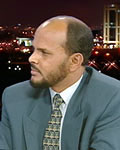|
Mauritania's Junta…Pro-France Colonels
 |
|
Col.
Vall, head of the military junta.
|
By
Sayed Ahmed, IOL Correspondent
NOUAKCHOTT,
August 4, 2005 (IslamOnline.net) – With no Islamic or nationalist
movements represented in the military junta, which carried out a
successful military coup against President Maaouya Ould Taya's regime,
Mauritania's military council is formed of a group of pro-France,
liberal and tribal leaders.
A
17-member junta, the Military Council for Justice and Democracy,
carried out a successful coup d'etat against Taya Wednesday.
Dominating
the main government buildings in the capital, the council said Col.
Ould Mohammed Vall, director of Mauritania's national security, was
declared head of the junta.
Col.
Vall is seen as a pro-France figure and a staunch supporter of
disseminating the French culture and language in the oil-rich country
at the expense of the Arabic language, according to IOL Correspondent.
Joining
the army in the 1960s, Vall was known for his military discipline and
loyalty to the ruling regime.
Fighting
on the side of Taya, who seized power in a military coup in December
1984, Vall obtained the confidence of the ousted Mauritanian president
who appointed him as the director of the national security.
Pious
Colonel
Col.
Abdul Rahman Ould Boubakeur is the junta's second-in-command.
Known
for his religious piety and discipline, Boubakeur was appointed as an
assistant chief of the armed forces following the failed 2003 coup
against Taya in a bid to contain unrest in the Mauritanian army.
Soon
after, he was at odds with the commander-in-chief of the armed forces
Col. Al-Arabi Ould Sid Ali, who is now detained by the coup leaders.
Col.
Mohamed Ould Abdul Aziz, another member of the military junta, is seen
as a secular commander.
But
he is not known for adopting a specific ideology.
Taking
part in suppressing the military coup against Taya in 2003, Abdul Aziz
was installed by the now ousted president as a commander of the
presidential forces.
Cautious
Welcome
Cautiously
welcoming the military coup against Taya's regime, Mauritanian
opposition parties urged the military junta to form a national unity
government to carry out reforms in the vastly desert country.
"In
this crisis situation, a regime change was inevitable. But we would
have wished that this be done in a controlled democratic way with all
the parties involved," said Messaoud Ould Boulkheir, president of
the Popular Progressive Alliance.
The
party also urged the military junta to form a national unity
government, representing all political parties in the country, to
introduce real reforms.
Following
the military coup, the military council said it would exercise
power for two years to allow time to put in place democratic
institutions.
The
opposition Union of Democratic Forces, led by Ahmed Ould Dada, also
welcomed the coup, calling on the military council to hold
"transparent" elections in a period less than the avowed
two-year period.
Celebrating
the coup against Taya's regime, hundreds of people have taken to the
streets of Mauritania's capital, shouting and honking car horns.
Many
people headed to work as usual in the capital early on Thursday.
Traffic flowed freely and small groups of soldiers guarded key
buildings, though in smaller numbers than on Wednesday, witnesses
said.
Islamists
Welcome
 |
|
Mansour
urged the coup leaders to release all political detainees.
|
Mauritania's
Islamic movement also welcomed the military coup against Taya's
repressive regime.
"Playing
the cloak of combating terrorism, Taya's regime excessively suppressed
the Islamic movements and overstepped all limits in supporting the
American and Zionist imperialistic policies, paying no heed to
opposition of the Mauritanian people," Abdullah Ould Sadana, an
Islamist activist, told IOL.
Jamil
Mansour, an Islamist leader, echoed a similar stance, urging the coup
leaders to release all political detainees from prisons and
"launch a new phase of reconciliation in the country".
However,
Abdullah Ould Yusuf, an Islamist, said the Islamic movement should
pursue their "struggle to achieve freedom, justice and
democracy".
"The
new leaders are undemocratic and will try to suppress the Islamists in
a bid to secure support of the Americans and Europeans."
Mauritania
-- which hopes to start pumping oil early next year -- is one of only
three Arab League member states that have established diplomatic ties
with Israel.
It
is also, according to analysts, one of the most repressive countries
in the region towards Islamist movements.
Police
have arrested scores of Islamic opposition leaders and activists since
April.
In
May, security forces searched mosques around the capital and arrested
imams.
Analysts
have warned that Mauritania 's attempts to stifle opposition groups by
denouncing them as terrorists risks backfiring by radicalizing
moderate Islamists.
|